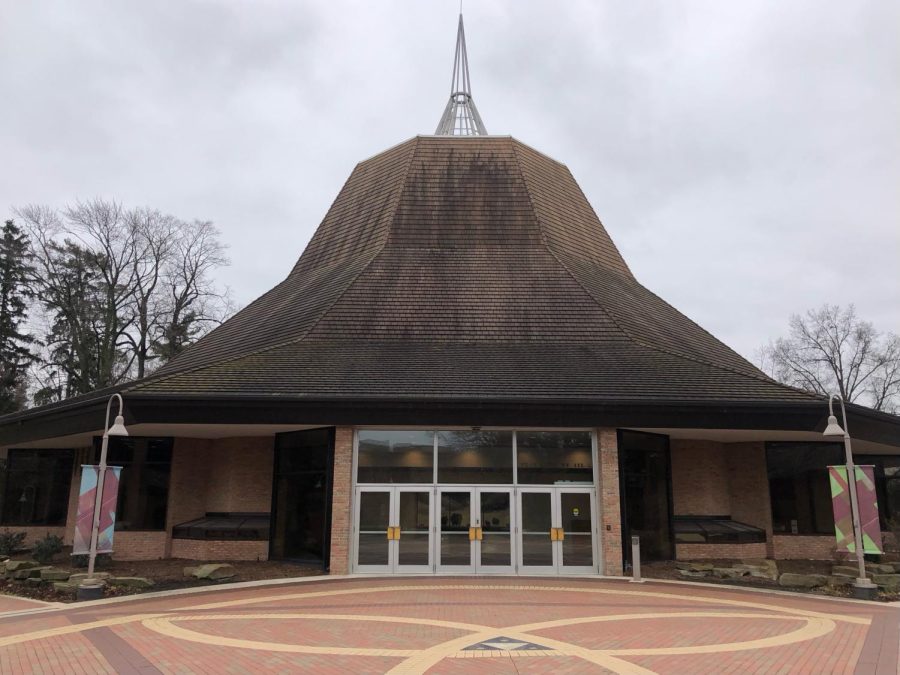Getting off the gerbil wheel: Keeping the Sabbath holy
Throughout Calvin’s history, observance of the Sabbath has shifted.
In the late 1940s, a resident of New Jersey wrote to Calvin’s then-president, Henry Schultze, with a grave concern: students traveling to and from Calvin on Sundays over holiday breaks. Traveling on the Sabbath might be a violation of its holiness –– but what if, by respecting the Sabbath, students had to miss classes? It seemed to be a lose-lose situation.
“Let me assure you that we are deeply interested in helping students avoid any form of Sabbath desecration,” Schultze wrote in a 1948 response to the letter, which can now be found in Heritage Hall. “In every case where students have made an earnest effort to return to school in time, without doing any Sunday traveling, they are granted an excuse from their classes in cases where they fail to arrive on time.”
The letter was not an isolated occurrence, and similar discussions continued for decades. In April 1973, the elders of a Christian Reformed Church in Massachusetts sent President William Spoelhof, Calvin’s seventh president, a letter. “The elders … have taken note of the fact that Calvin College requires its students to return to classes on the Monday following a vacation period,” they wrote. “This results in many students using the Sabbath for travel purposes, and even though we realize that the school does not condone this, the effect is that you are encouraging it in many instances.” Instead, the elders recommended that classes resume on Tuesday.
But today, classes after holiday breaks still resume on Mondays, and many students wouldn’t think twice about Sunday travel. The CRC and Calvin have always been concerned with keeping the Sabbath holy –– but what, exactly, does that entail? Student interpretations have always varied, but the accepted meaning of the Sabbath has relaxed considerably since the 1940s, perhaps reflecting the increasing diversity of backgrounds among students at Calvin. The idea of a rest day, however, has persisted.
The old way
James Bratt, who grew up in Grand Rapids and graduated from Calvin in 1971, experienced Sundays in his childhood as “legalistic, repressive and restrictive.” “It was a whole bunch of ‘don’t’s –– I couldn’t ride my bike, couldn’t play ball,” he said. “When you rented a cottage in the summer, you weren’t supposed to go swimming on a Sunday, because God would make it [so] that you drown. There were stories told like that.”
When Bratt attended Calvin, the vast majority of students belonged to the CRC –– which carried a “native compulsion [to attend church on Sundays], which you either complied with or defied,” he said. “There was no church attendance requirement. You were just encouraged.” No campus facilities were open on Sundays, besides the dining hall.
Alumna Agnes Fisher, who graduated in 1965, told Chimes in an email that she went to church every Sunday and sometimes attended evening services, too. Then, she “did a lot of reading, visiting friends [and] partying” –– although she rarely did school activities on the Sabbath, and she never shopped.
Bratt recalled a story about former Professor George Marsden, who began teaching at Calvin in 1965. Marsden, who did not come from a CRC background, was once seen playing tennis near campus on a Sunday.
“[Marsden] got ratted out right away, and President Spoelhof called him in,” Bratt said. Marsden, according to Bratt, defended himself like this: “I read about religion all week. That’s my job. And so, on Sunday, you’re supposed to do something different –– so, tennis!”
In the end, Bratt told Chimes, Spoelhof gave in –– but requested that Marsden at least play tennis “in a less conspicuous place.”
In 1987, Bratt returned to Calvin as a history professor. He observed a shift away from the legalistic Sabbath he had experienced in his youth. Although campus facilities were still “minimal” on Sundays, Bratt said, he saw many faculty members enjoying recreational Sabbath activities like going to the beach and playing tennis.
As a professor involved in “all-consuming” academia, on top of parental duties, Bratt appreciated the rest offered by his own Sabbath observance: “I could get off the gerbil wheel. It was a tremendous relief.”
Bratt witnessed shifts in the student population, too, although there was considerable variability. “The percentage of students who were CRC really fell persistently. And if you hadn’t grown up CRC, you didn’t have that strict Sunday code,” Bratt said. “Among the student body, there was a lot more latitude [in keeping the Sabbath].”
A middle way
Alumna Christina Lier Ball, a 1991 graduate, said that her typical Sunday involved going to church, doing homework and seeing family and friends. “I was raised to not shop or go to restaurants on the Sabbath. Since I spent the day with family, I didn’t change my habits,” she said. But many of her peers, she told Chimes, were happy to shop on Sundays –– a departure from the stricter regulations that had once been common.
Meanwhile, Tony Boer, who graduated in 1993, went to church most Sundays –– but “that was pretty much all I did to keep [the Sabbath],” he said. “The rest of the day was pretty similar to other days, such as hanging with friends and studying.”
Boer had grown up attending two services on Sundays, so he was initially surprised that Calvin did not offer an evening service. William Katerberg, professor of history, told Chimes via email that, after the 1970s, some CRC churches stopped offering second services. At the same time, many started offering activities during the week, such as Bible studies and small groups.
Alumna Karen Perdew (class of 1992) told Chimes that she attended church every Sunday morning, but she never took a full day of rest. “Even though it would have been nice, it wasn’t realistic,” she said. “I felt that taking time out on Sunday from what my normal school week looked like was important for keeping the Sabbath.” Perdew saw the students around her taking a variety of approaches to the Sabbath, with some completely disregarding it but most attending church.
A new way
In his decades of teaching, Bratt told Chimes that he witnessed a “constant, very low-key refrain” from students who wanted more campus facilities –– especially the gym –– to be available on Sundays. In turn, Bratt said, students received “persistent pushback” from Calvin for the sake of its staff: opening facilities on Sundays required staff to work on Sundays too.
But eventually, Calvin began to open the gym on Sundays. This occurred around 2008, according to John Britton, associate dean of Campus Involvement and Leadership.
Moreover, about a year and a half before the pandemic, Calvin opened the main floor of the library on Sunday afternoons, Dean of the Library David Malone told Chimes via email. No library –– or barista –– services were available, however. These Sunday afternoon hours halted during COVID-19, and they haven’t been restored –– not due to Sabbath concerns, but due to “significant budget cuts to the library student staff’s budget,” Malone wrote.
Today, Calvin has a more religiously diverse population than ever, and students’ Sabbath practices reflect that. “I know a lot of people who are really intentional about making that their day, if only to have a day [of rest],” said senior Katie VanDyke. “But also, I talk to a lot of people who are like, ‘Yup. [Homework] gets pushed off until Sunday.’”
But the Sabbath remains as important today as it ever was, according to University Pastor Mary Hulst. “Our denomination has always valued Sunday as a special day: a day of rest, a day of worship, a day to renew relationships with God and others,” she said. “We want to lift Calvin up as a place that values good rest [and] good rhythm. We are not interested in being a 24/7, grind and grind and grind type of culture. That’s not how we’re designed.”
The Sabbath is not about legalism, Hulst continued. “We want to see this as invitational. It’s like the joy of a snow day,” she said. It’s a “gift” that is “designed to renew and restore us” –– and, according to Hulst, scientific studies support the importance of a day off too. “You actually are more productive and healthy the rest of the time,” she explained.
In the future, Hulst hopes to see Calvin “lean in” to the Sabbath even more. For instance, Hulst suggested faculty could avoid assigning work that would be due on Sunday or Monday mornings. “I would hope that we become a more countercultural campus,” she said.
And for his part, Bratt foresees more and more nuanced discussion on the topic: “a good old, traditional Calvin, very informed conversation,” as he put it.







E J DeVries • Jan 24, 2023 at 4:44 pm
A real Sabbath f0or students would be to NOT study on Sunday. Our now grown children were told they could not study on Sunday. Any school work had to be completed by Saturday night. This was really freeing for them. We went on bike rides as a family, we played games, and always went to church twice on Sunday.Think of what you are free to do rather than what you cannot do.